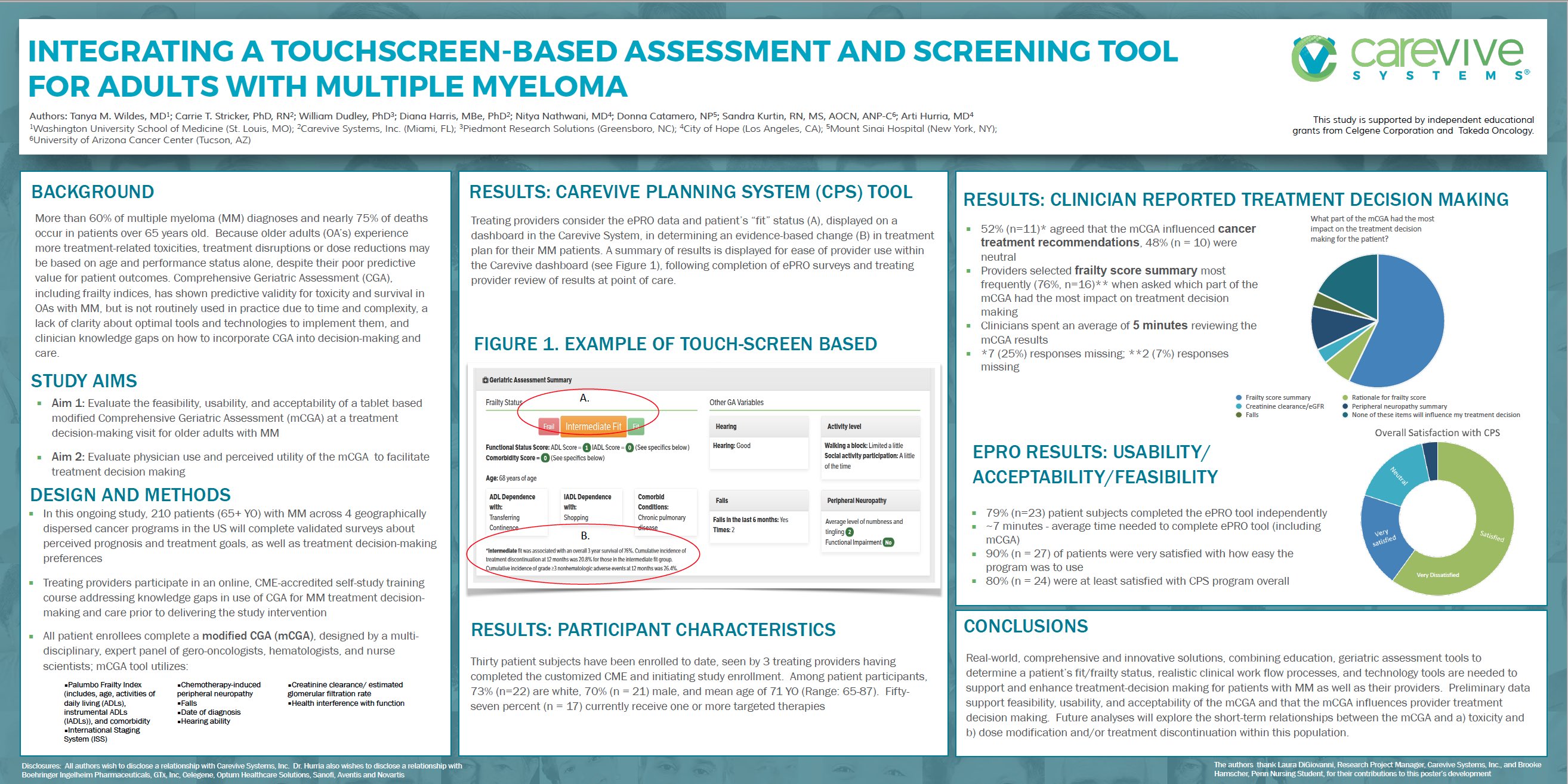
Integrating a Touchscreen-Based Assessment and Screening Tool for Adults With Multiple Myeloma
Authors: Tanya M. Wildes, MD1; Carrie T. Stricker, PhD, RN2; William Dudley, PhD3; Diana Harris, MBe, PhD2; Nitya Nathwani, MD4; Donna Catamero, NP5; Sandra Kurtin, RN, MS, AOCN, ANP-C6; Arti Hurria, MD4
1Washington University School of Medicine (St. Louis, MO); 2Carevive Systems, Inc. (Miami, FL); 3Piedmont Research Solutions (Greensboro, NC); 4City of Hope (Los Angeles, CA); 5Mount Sinai Hospital (New York, NY); 6University of Arizona Cancer Center (Tucson, AZ)
Poster presented at ASH 2016
Background
More than 60% of multiple myeloma (MM) diagnoses and nearly 75% of deaths occur in patients over 65 years old. Because older adults (OA’s) experience more treatment-related toxicities, treatment disruptions or dose reductions may be based on age and performance status alone, despite their poor predictive value for patient outcomes. Comprehensive Geriatric Assessment (CGA), including frailty indices, has shown predictive validity for toxicity and survival in OAs with MM, but is not routinely used in practice due to time and complexity, a lack of clarity about optimal tools and technologies to implement them, and clinician knowledge gaps on how to incorporate CGA into decision-making and care.
Study Aims
- Aim 1: Evaluate the feasibility, usability, and acceptability of a tablet based modified Comprehensive Geriatric Assessment (mCGA) at a treatment decision-making visit for older adults with MM
- Aim 2: Evaluate physician use and perceived utility of the mCGA to facilitate treatment decision making
Design and Method
- In this ongoing study, 210 patients (65+ YO) with MM across 4 geographically dispersed cancer programs in the US will complete validated surveys about perceived prognosis and treatment goals, as well as treatment decision-making preferences
- Treating providers participate in an online, CME-accredited self-study training course addressing knowledge gaps in use of CGA for MM treatment decision-making and care prior to delivering the study intervention
- All patient enrollees complete a modified CGA (mCGA), designed by a multi-disciplinary, expert panel of gero-oncologists, hematologists, and nurse scientists; mCGA tool utilizes:
- Palumbo Frailty Index (includes, age, activities of daily living (ADLs), instrumental ADLs (IADLs)), and comorbidity
- International Staging System (ISS)
- Chemotherapy-induced peripheral neuropathy
- Falls
- Date of diagnosis
- Hearing ability
- Creatinine clearance/ estimated glomerular filtration rate
- Health interference with function
Results: Carevive Planning System (CPS) Tool
Treating providers consider the ePRO data and patient’s “fit” status (A), displayed on a dashboard in the Carevive System, in determining an evidence-based change (B) in treatment plan for their MM patients. A summary of results is displayed for ease of provider use within the Carevive dashboard (see Figure 1), following completion of ePRO surveys and treating provider review of results at point of care.
Results: Participant Characteristics
Thirty patient subjects have been enrolled to date, seen by 3 treating providers having completed the customized CME and initiating study enrollment. Among patient participants, 73% (n=22) are white, 70% (n = 21) male, and mean age of 71 YO (Range: 65-87). Fifty-seven percent (n = 17) currently receive one or more targeted therapies.
Conclusions
Real-world, comprehensive and innovative solutions, combining education, geriatric assessment tools to determine a patient’s fit/frailty status, realistic clinical work flow processes, and technology tools are needed to support and enhance treatment-decision making for patients with MM as well as their providers. Preliminary data support feasibility, usability, and acceptability of the mCGA and that the mCGA influences provider treatment decision making. Future analyses will explore the short-term relationships between the mCGA and a) toxicity and b) dose modification and/or treatment discontinuation within this population.




